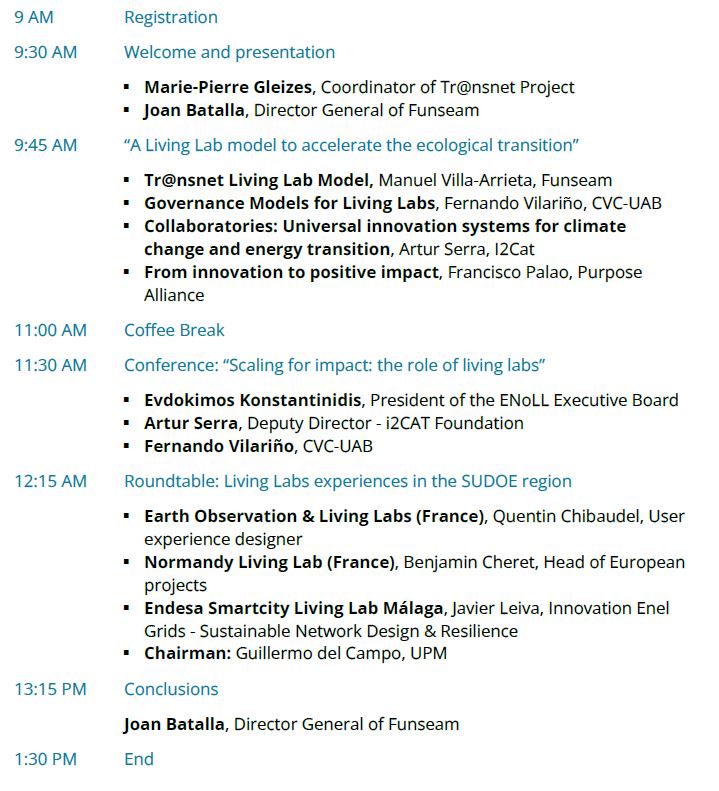scaling for impact: the role of living labs workshop
Innovation for the ecological transition
Decarbonising the economy requires a huge leap forward in innovation. However, while innovation continues at an unprecedented pace, innovations often require deeper and more effective validation and involve the participation of all stakeholders, primarily the participation of end-users.
As a solution to this problem, the Living Lab concept emerged in the late 1990s to address the design, development, testing and improvement of innovations in real-world contexts based on user-centered research methods. The result is that end-users are involved in a process of co-creation in real-life conditions. Today, Living Labs have evolved into a more robust research approach, linking different disciplines to respond
to the challenges of industrial sectors and the economy.
However, there is still a long way to go to create Living Labs adapted to the requirements of the ecological transition. This process of transversal transformation of the economy requires innovations that prioritise the reduction of environmental, social and economic impact, and the protection of consumer interests. Similarly, existing Living Labs also need to rethink their value proposition in the new innovative environment.
In this context, university campuses are positioned as real environments to study initiatives, develop them and validate them as innovations for the market. In these environments, university technology transfer and innovation departments can see in participation in Living Labs an opportunity to establish new research relationships in the context of open innovation in order to advance technological, social and regulatory innovation that will enable new products and services with robust business models to enter the market.
A Living Lab model to accelerate the ecological Transition
From a model of innovation focused on technological aspects, we are moving towards new environments based on collaboration between the academic and private sectors, the industry, the government and the direct participation of society as a whole to establish scenarios for innovation and economic development. Undoubtedly, a decisive contribution to an innovation process characterised by digitalisation, the advanced use of data, the integration of regulatory innovation as an essential element that will undoubtedly make a decisive contribution to respond to the social and environmental challenges of the ecological transition. However, the implementation of any Living Lab is not without its challenges and aspects to be taken into account.
With the aim of overcoming all these issues, the Tr@nsNet project promotes, as the main result of a three-year research, a Living Lab model that promotes the integration of technological, social and regulatory innovation necessary to face the challenges towards the achievement of a decarbonised and sustainable economy. This proposal seeks to support the quadruple helix model promoted by the European Network of
Living Labs (ENoLL) to help improve the value proposition of Living Labs and the innovations validated in these open innovation environments. The suggested model integrates five tools that make it possible to generate new innovation systems based on collaboration between different ecosystems made up of territorial communities, projects and technology developers, but with a focus on global positive social and environmental impact.
Workshop: “Scaling for Impact: The role of Living Labs
Within the framework of Tr@nsnet and with the aim of presenting the Living Lab model proposed by this project, the Workshop “Scaling for Impact: The role of Living Labs” will be held in Seville. The event will be attended by the President of ENoLL and experts from the innovation sector. Representatives from Living Labs in the Sudoe region will talk about their experiences and the competitive advantage of ENoLL certification.
Agenda

